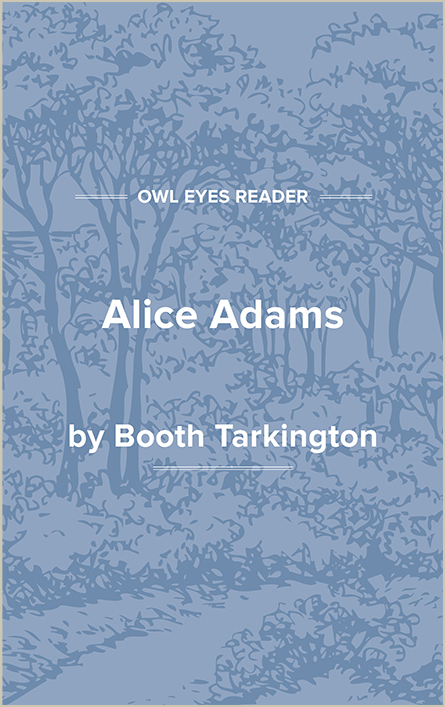Study Guide
Summary
Alice Adams, the eponymous heroine of Booth Tarkington’s novel, is a character very like other heroes and heroines in literature who test the American myth of success expressed best by the Horatio Alger stories. Like Alger’s “Ragged Dick,” Alice Adams strives to lift herself into another social realm from the one in which she was born. Yet in her desire for a marriage that would satisfy her need for a specifically economic and material freedom, she perhaps reminds readers most of F. Scott Fitzgerald’s Jay Gatsby, who seeks to marry Daisy as a final acquisition marking his success in the world.
As Tarkington’s novel begins, Alice’s family occupies a tenuous position in the mid-level manufacturing class of post-World War I Indiana. Their position affords them a modicum of respect, but they have slowly but surely felt the pinch of declining fortune. They manage to keep a cook, for example, but they can only afford to hire the surly specimens no other, more respectable families will employ.
Intent on improving the family fortunes, Mrs. Adams browbeats her husband Virgil into leaving his position with “Lamb, and Company,” where he is respected for his work ethic, honesty, and loyalty. She insists he leave the “old hole,” as she calls it, to start his own manufacturing company. Virgil’s ethical dilemma revolves around his knowledge of a secret glue formula, the rights to which are owned by Mr. Lamb. Because Lamb has done nothing with the formula for years, Virgil allows himself to be convinced by his wife to steal it, quit his position, and open his own glue factory.
Virgil’s ethical dilemma and subsequent fall parallel his daughter’s attempt to lift herself socially, also through unethical means. Alice’s head is filled with romance, and she begins lying in a futile attempt to deny the grim reality of the family’s declining stature. In this pursuit, she is encouraged by her mother, whose mending of old dresses so they will appear to be new is a benign example of how Alice begins by shading the truth and ends by lying outright. Tarkington masterfully illustrates the process whereby economic emulation gradually becomes pernicious dishonesty. In a famous scene, Alice meets Arthur Russell and tries to impress him by lying that she has been to the tobacconist to procure cigars for her father, who never, she assures him, smokes a pipe; this petty lie grows into a larger claim that her father occupies an almost aristocratic position of wealth and power. The lies grow as Alice and Arthur fall in love, but the lies are ultimately unable to sustain the fiction of an upper-class life she has created.
Three strands of the narrative come together when Mr. Alfred comes to dinner at the Adams home. The behavior of Alice’s family...
(The entire page is 709 words.)
Owl Eyes subscribers get unlimited access to our expert annotations, analyses, and study guides on your favorite texts. Master the classics for less than $5/month!

